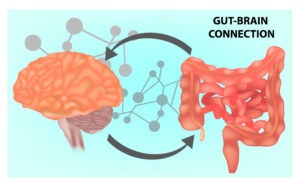Food has one of the most important roles for our bodies. It nourishes us, gives us energy for daily tasks, and gives us nutrients that help grow and repair the body. But poor eating habits can have serious consequences on your mental health.
The gastrointestinal tract is often referred to as the “second brain,” and if your stomach becomes unhappy, then it can lead to negative effects on your mental health. This post will inform you about how food affects your mood and how you can help your mental health through your eating habits.
How Food Affects Mood
The brain and your gastrointestinal tract share an important connection between diet and emotions. The GI tract houses billions of bacteria that can affect the creation of neurotransmitters. These neurotransmitters carry messages from the body to the brain.
Healthy food help your GI tract grow healthy bacteria, and this results in positive neurotransmitter production. Positive neurotransmitter production allows your brain to receive positive messages easily, but an unhealthy diet will do the opposite. Unhealthy foods like sugar can inflame the GI tract and hurt neurotransmitter production, allowing bad bacteria to form.
Sugar can give people spikes in neurotransmitters like dopamine that make them feel good, but these positive feelings are only temporary. Sugar rushes can be detrimental to one’s mood because they come with a high of positive feelings, but the crashes experienced afterward are bad for the brain.
Sticking to a healthy diet will help you have fewer fluctuations in your mood, allowing you to be happier and more energized. Healthy diets have also proven to alleviate symptoms of anxiety and depression.

Healthy Foods
With all this talk about how the GI tract affects the brain, what kind of healthy foods should you be on the lookout for?
Whole foods: Think about fresh fruits and vegetables. Some studies are reporting that preservatives or other food additives can worsen symptoms of depression and anxiety. If you’re buying pre-packaged meals, look for ones that are unprocessed and use healthy ingredients.
Fermented foods: The fermentation process loads the fermented food with probiotics, and this kind of bacteria is fantastic for the GI tract. Foods like kombucha or sauerkraut are a great place to start, or you can try to ferment your own foods too!
Fiber: Look for plant-based foods like whole grains, beans, and vegetables. Fiber helps the body absorb glucose (sugar from food) slower so that you don’t have to experience sugar rushes and crashes.
Antioxidants: Look for leafy greens, berries, or even foods with fatty acids in them like salmon. These foods can help fight inflammation in the body.
We’ve only discussed four different groups of foods, but there are many kinds out there that can help promote gut health. Don’t forget that a healthy gut promotes a healthy brain, so if you’re struggling with different symptoms of anxiety or depression, try switching out some foods in your diet with some from this list to improve your mental health.




